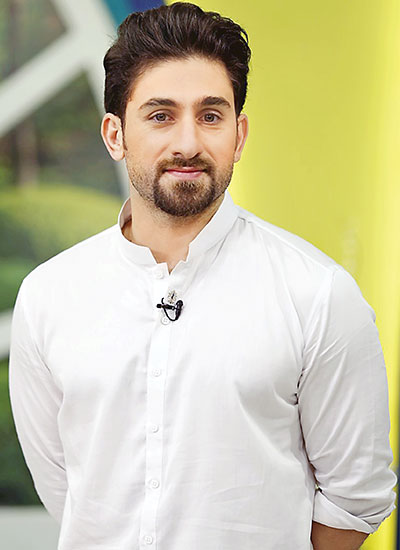THREADS OF SUCCESS
- 06 Apr - 12 Apr, 2024
Popular with his screen name Shaz Khan, Pakistani/American actor Shazli Hafeez Khan, has proven his mettle in Pakistan’s entertainment industry by playing a diverse range of characters. His debut Pakistani film, Moor, introduced him to the many possibilities of the local cinema, which led him to take up roles not many would consider choosing. For instance, playing the character of a slain lawyer in hit drama serial Yakeen Ka Safar, is an evidence of how important the character was to Shaz, for not many budding male actors would want their character to get killed before a story’s happy ending. MAG got in touch with the fair lad in the quest to find out more about his love for acting, his perception of success, what’s next on his agenda and much more. Read on!

You are witnessing immense professional success at the moment, how do you feel about it?
One should always be grateful no matter what, but I must say that this feels great. I always envisioned acting and making movies while pursuing other passions, so it also feels inevitable. It also doesn’t change the fact that the work only gets harder now, but I live for that.
You gave up your career in finance to get into acting – a pretty life-changing decision. Considering where you are right now, do you think you made the right call?
I think you know the answer to that! Back then it felt life-changing, but now I know there is no risk if you just follow your own instincts and feelings about the kind of life you want to live. I am walking proof of that. It will not always be easy, but learn at every step and keep being aligned with the things you want, and you will always get to your natural next step.
Your breakthrough among Pakistan’s TV audience happened after Yakeen Ka Safar. Did you expect the positive reception?
I just focus on the work and do a prayer at the end then move on. You can’t predict anything in this business. I did feel the drama was unique and had a resonating story but the response to the character and story was incredible. I was glad [for it] because Daniyal was one of those characters we can all aspire to be.
It is generally observed that actors in Pakistan are not as popular among the masses unless they have worked on TV, because despite the progression, majority of the population is still not going to the cinema and choose to watch TV instead. What are your thoughts on this notion?
I agree, but I never want to just do TV to get popular. To me, cinema is king though, it is about the only place where a bunch of random strangers pay to go to a dark room and share a story that is cut to images and sound. And if the film is good, they [audience] can do [watch] it without looking at their phone for a few hours.
Considering your long affiliation with acting, how much do you think have you progressed professionally?
I want to say that I am the best actor around, but [then there are] those days when you are on set and things are not clicking; you feel [things are] no different than that very first audition you gave. I will give myself credit for just enjoying it more and not looking at the mirror as often.
Even though it is generally believed that artistes share similar traits around the world, how easy or difficult was it for you to mould yourself into Pakistan’s entertainment industry as an actor?
I do not think about moulding into anything, if it feels right I go [with it]. Working in Pakistan felt right, so I just focused on what I wanted to do and did not break the golden rule. We all forget that if we are honest and just trust ourselves, it will all work out.
Keeping in mind the work actors do and its impact on the audience, do you think you have a social responsibility to fulfil?
It has got to come from who you are though, social responsibility just on an actor’s duty list will not do any good to anyone. We should be asking ourselves the deeper questions and that inevitably leads us to those causes and issues we will care about. I think the internal work is overlooked.
The trend of award functions and accolades being showered upon celebrities is getting quite prevalent. How important do you think a trophy is for an actor?
[It is] as important as a medal was to Mother Teresa; although you can’t take the vanity out of us actors. It is a tricky one.
Since you’ve been working here for a few years now, how important of a role can established showbiz professionals play in order to disseminate the art of drama and filmmaking in the country?
I can’t speak for anyone else, but I, myself want to just get better and work with new artistes who are bringing exciting new ideas into the industry.
Where do you think Pakistani cinema currently stands?
Our industry is getting mature with the passage of time. We are young and exploring all possibilities which will lead to ecstasy and certain disasters as well. Let’s just strive to create better scripts which will lead to better movies.
Do you ever plan to work across the border?
Someone has to ask [me] first, which hasn’t happened yet.
What’s next on your agenda?
Getting back to my filmmaking roots and working on a film I have been developing for the past couple of years. It will be shot in California and Pakistan, and is about a desi mixed martial artiste.
COMMENTS